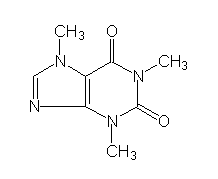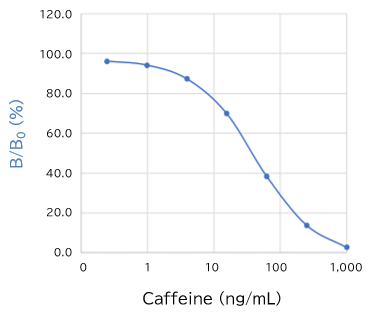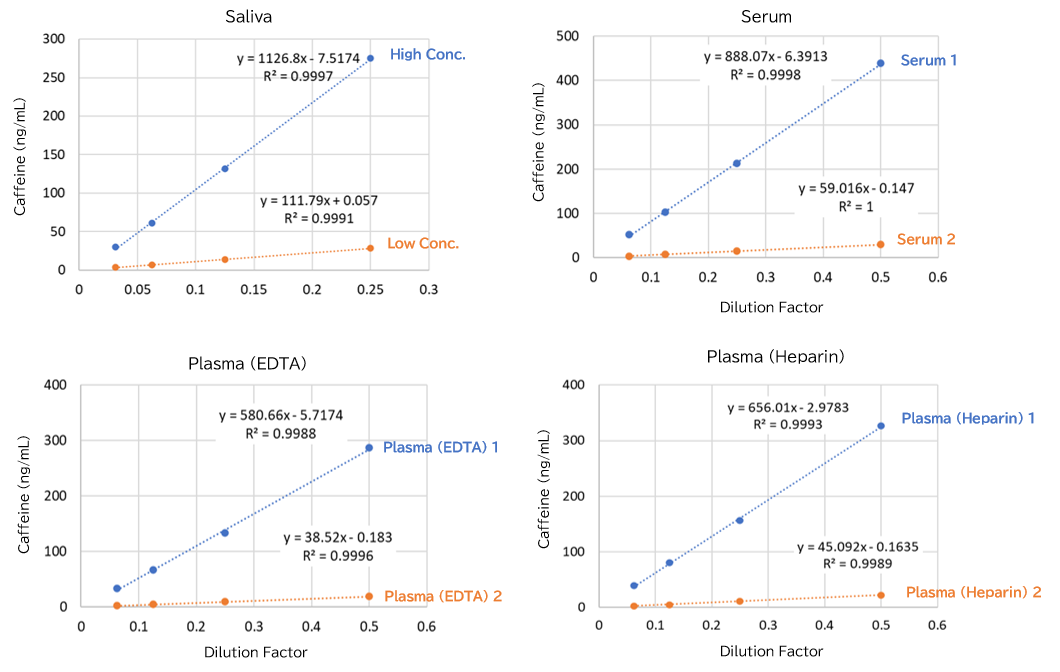Caffeine ELISA Kits
Caffeine is a type of alkaloid found in coffee beans and tea leaves. It induces wakefulness and has an excitatory effect through the competitive inhibition of adenosine receptors. Caffeine is also known to have various physiological effects, including vasoconstrictive, cardiotonic, and diuretic effects, as well as promoting gastric secretion. Reports have shown that blood caffeine can be a useful biomarker for Parkinson's disease, and that caffeine has protective effects against Parkinson's disease. Therefore, it is attracting attention in the field of neurological and psychiatric disorders.
Caffeine is mainly measured by LC-MS/MS or HPLC, but the assay of caffeine used to include the need for expensive analytical equipment and complicated pretreatment. Fujifilm Wako has developed an ELISA kit that can measure the concentration of caffeine in human saliva, serum or plasma and mouse/rat serum or plasma.
What is Caffeine?

Caffeine (methyltheobromine) is a type of alkaloid found in coffee beans and tea leaves. It acts on the central nervous system and induces wakefulness and has an excitatory effect. Caffeine also exhibits various physiological effects, including vasoconstrictive, cardiotonic, and diuretic effects, as well as promoting gastric secretion. Its mechanism of action includes competitive inhibition of adenosine receptors, inhibition of phosphodiesterase, and stimulation of intracellular calcium release.
In patients with Parkinson's disease, blood caffeine levels are significantly lower compared to healthy individuals1), suggesting that caffeine could be used as a biomarker for Parkinson's disease. Furthermore, caffeine reportedly has a protective effect against Parkinson's disease2), drawing attention in the field of neurological and psychiatric disorders.
Caffeine is mainly measured by LC-MS/MS or HPLC, but the need for expensive analytical equipment and the complexity of sample pre-treatment have been challenges .
Caffeine ELISA Kit Wako
Caffeine ELISA Kit Wako is an ELISA kit that can measure caffeine in human saliva, serum or plasma and mouse/rat serum or plasma.
Kit Performance
| Calibration curve range | 0.244 - 1,000 ng/mL |
|---|---|
| Assay target | Caffeine |
| Analysis sample | Human saliva/serum/plasma (EDTA/heparin) Mouse serum/plasma Rat serum/plasma |
| Sample volume | 55 μL (2-fold dilution, duplicate) |
| Measurement duration | Approx. 2 hours 20 minutes |
| Detection method | Chromogenic (Primary wavelength 450 nm / reference wavelength 620 nm) |
Assay Principle
This kit is based on a competitive assay, and absorbance intensity
decreases as the amount of caffeine in the sample increases.

Example of Calibration Curve

Performance Data
Dilution linearity test
Human

Mouse

Rat

References
- Ohmichi, T. et al.: Front. Neurol., 11, 580127(2020).
Quantification of Blood Caffeine Levels in Patients With Parkinson's Disease and Moltiple System Atrophy by Caffeine ELISA. - Qi, H. & Li, S.: Geriatr. Gerontol. Int., 14(2), 430(2014).
Dose–response meta‐analysis on coffee, tea and caffeine consumption with risk of Parkinson's disease.
Product List
- Open All
- Close All
For research use or further manufacturing use only. Not for use in diagnostic procedures.
Product content may differ from the actual image due to minor specification changes etc.
If the revision of product standards and packaging standards has been made, there is a case where the actual product specifications and images are different.
The prices are list prices in Japan.Please contact your local distributor for your retail price in your region.



